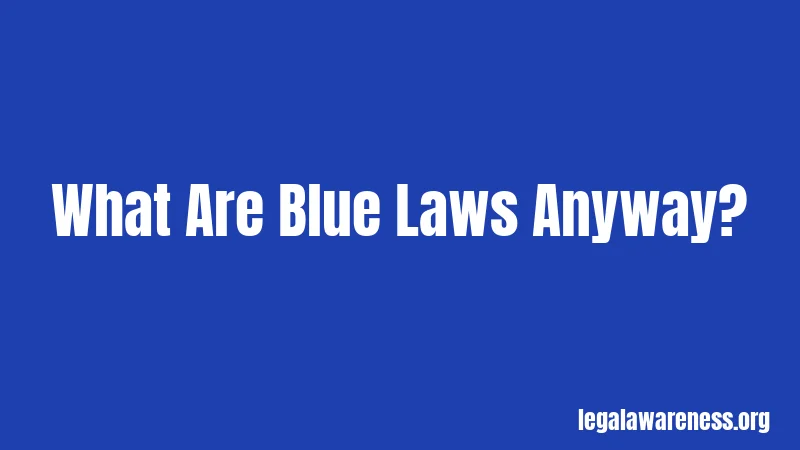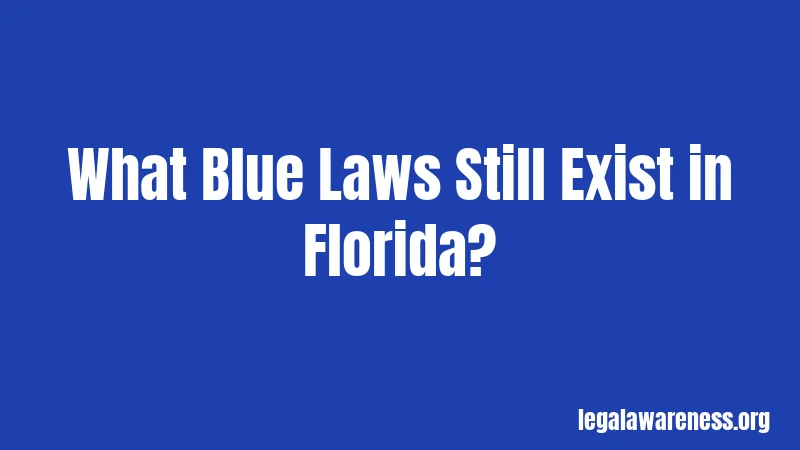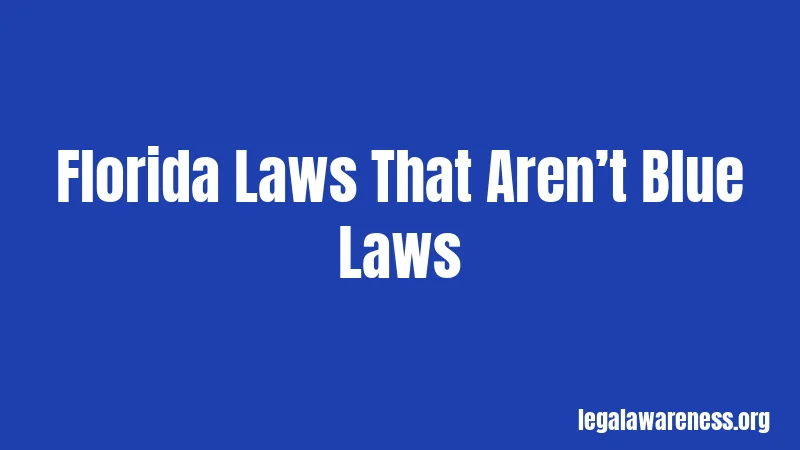Blue Laws in Florida (2026): What Still Exists Today
Most people have no idea Florida even has blue laws. Seriously. The state’s known for beaches and Disney, not Sunday shopping restrictions. But here’s the deal: Florida still has some blue law remnants hiding in certain counties. Let’s break down what’s actually still on the books and what disappeared years ago.
What Are Blue Laws Anyway?

Blue laws are old-school Sunday restrictions. They’re laws that limit what you can buy or do on Sundays. Think of them like a weekly pause button that started way back in the 1600s when Puritan settlers wanted everyone to respect the Sabbath.
The name probably came from the blue paper these laws were printed on. Pretty simple. These laws used to control everything. Shopping, drinking, working, even having fun. Most of that’s gone now, but not all of it.
Florida’s Blue Law History
Hold on, this part is important. Florida used to have strict Sunday laws. Really strict. Back in 1909, an Escambia County Sheriff even threatened to arrest streetcar conductors if they worked on Sundays. Can you imagine?
The laws said you couldn’t keep a store open on Sunday. You’d get fined up to $50. That was serious money back then. You couldn’t make employees work either, except for “necessity” jobs.
But times changed. Most of Florida’s blue laws got repealed decades ago. The state doesn’t enforce statewide Sunday restrictions anymore. That’s the good news.
What Blue Laws Still Exist in Florida?

Okay, here’s where it gets interesting. Florida doesn’t have statewide blue laws anymore, but some counties still have their own rules. It’s a patchwork situation.
Alcohol Sales on Sundays
This is where most people notice blue laws. Florida law says alcohol can be sold starting at 7 a.m. on Sundays statewide. Sounds straightforward, right?
Not exactly. Each county gets to set its own hours. Some are more relaxed. Miami-Dade County? You can buy alcohol 24/7, seven days a week. Basically no restrictions.
Other counties had stricter rules until recently. Polk County used to be completely dry on Sundays. Like, zero alcohol sales. They changed that in 2020, and now sales start at 7 a.m. on Sundays. Hillsborough County still makes you wait until 11 a.m. on Sundays in some areas.
Pinellas County updated their laws in 2024. Now alcohol sales start at 8 a.m. daily. It’s all about local control.
Dry Counties Still Exist
Wondering if Florida has any totally dry counties? Yep, one. Liberty County in the Panhandle is the only completely dry county in Florida as of 2026. No alcohol sales at all, any day of the week.
Lafayette County is partially dry. You can buy beer, but that’s it. No wine or liquor sales allowed. Washington County also has significant restrictions on alcohol sales.
These are vestiges of old temperance beliefs. Most Florida counties moved past this decades ago, but these three hung on.
The Sex Toy Sunday Rule
Sound complicated? It’s actually pretty obscure. Some sources mention that certain Florida counties prohibit sex toy sales on Sundays. This is one of the weirder blue law remnants.
Honestly, this law is rarely enforced. Most people don’t even know it exists. It’s in the same category as those old laws about not tying your elephant to a parking meter.
What About Car Dealerships?
Here’s good news for Florida car shoppers. Florida does NOT have a statewide ban on Sunday car sales. You can buy a car on Sunday in Florida.
Twelve states ban car dealerships from opening on Sundays. Florida isn’t one of them. States like Illinois, Pennsylvania, and Michigan? Dealerships must close. But Florida, California, New York, and Georgia allow Sunday sales.
That said, many Florida dealerships choose to close on Sundays anyway. Not because they have to. They do it to give employees a guaranteed day off. Car sales is exhausting work. Long hours, high pressure, lots of competition.
Plus, banks are closed on Sundays. That makes financing complicated. So even though it’s legal, you’ll find plenty of closed dealerships on Sunday in Florida. It’s a business choice, not a legal requirement.
Florida Laws That Aren’t Blue Laws

Let me clear up some confusion. Some people think certain Florida laws are blue laws when they’re actually just regular laws.
The ban on childlike sex dolls? Not a blue law. That went into effect in 2019 after Governor DeSantis signed it. It’s a year-round law protecting children, not a Sunday restriction.
Sunday hunting restrictions? Not really a Florida thing. Some states ban hunting on Sundays. Florida doesn’t have that statewide. You can hunt on Sunday in most of Florida.
How Florida Blue Laws Changed Over Time
The big shift happened in 2011. The Florida Legislature passed a law letting cities and counties opt out of blue law restrictions. This effectively killed most remaining blue laws.
Before that, counties had Sunday alcohol bans or noon restrictions. After 2011, counties started relaxing the rules one by one. The trend is toward fewer restrictions, not more.
Why the change? Economics, mainly. Tourism is huge in Florida. Visitors want to buy alcohol on Sunday mornings. Restaurants and bars want to serve brunch with mimosas. The old restrictions just didn’t make sense anymore.
Cultural attitudes shifted too. Most people don’t see Sunday as a mandatory rest day anymore. It’s just another day of the week for many folks.
Which Counties Have the Strictest Rules?
If you’re visiting Florida and want to avoid surprises, here’s what you need to know. The Panhandle counties are the most restrictive. Liberty, Lafayette, and Washington counties have the tightest alcohol rules.
Baker County used to be dry on Sundays too, but that’s changed in recent years. Suwannee County restricts liquor and wine sales between 1 a.m. and 7 a.m. on Sundays, which is pretty standard across Florida.
Most of South Florida is very relaxed. Miami-Dade, Broward, and Palm Beach counties have minimal restrictions. Central Florida counties vary but generally lean toward fewer restrictions.
What Happens If You Break These Laws?
Pretty straightforward penalties here. If you’re a business owner who sells alcohol during prohibited hours, you can face fines. The amount varies by county.
For individuals, you won’t get arrested for trying to buy alcohol during restricted hours. The store just won’t sell to you. Simple as that.
Liberty County is different. Since it’s completely dry, any alcohol sale is illegal. Businesses caught selling face serious penalties, including losing their license.
How to Know Your Local Rules
Here’s the practical advice. Don’t assume Florida laws are the same everywhere. They’re not.
Check your county’s official website before planning Sunday activities. Most counties post their alcohol sales hours online. You can also call the local Alcoholic Beverage Control board.
When you’re at a store, just ask. Cashiers know their local rules. If they can’t sell you something, they’ll tell you why.
Planning a Sunday brunch event? Call the restaurant ahead. They’ll know exactly when they can start serving alcohol in their area.
Comparing Florida to Other States
Florida is actually pretty relaxed compared to many states. You’re gonna love this one. Some states have way stricter blue laws.
Mississippi prohibits alcohol sales on Sundays statewide. Oklahoma does too for most retail sales. Bergen County in New Jersey bans the sale of clothing, electronics, and furniture on Sundays. Seriously.
Pennsylvania and Connecticut prohibit hunting on Sundays. Minnesota only allows liquor stores to be open from 11 a.m. to 6 p.m. on Sundays.
Florida looks like freedom compared to these places. Most of the state lets you do whatever you want on Sunday.
The Future of Blue Laws in Florida
Honestly, blue laws are dying out in Florida. The trend is clear. Every few years, another county relaxes its restrictions.
Will Liberty County ever allow alcohol sales? Maybe. Public opinion seems to be shifting statewide toward fewer restrictions. But these decisions happen locally, so it’s hard to predict.
Don’t expect new blue laws to pop up. That ship has sailed. The momentum is all in the opposite direction. Economic pressure and changing attitudes basically guarantee fewer restrictions over time.
Frequently Asked Questions
Can you buy alcohol on Sunday in Florida? Yes, in most counties you can buy alcohol starting at 7 a.m. on Sundays. Some counties like Miami-Dade allow 24/7 sales. A few counties have later start times or complete bans.
Are car dealerships open on Sunday in Florida? Florida law allows Sunday car sales, but many dealerships choose to close anyway. It’s a business decision, not a legal requirement. Always call ahead to check.
What is the only dry county in Florida? Liberty County is the only completely dry county in Florida as of 2026. Lafayette County is partially dry, allowing beer but not wine or liquor.
Did Florida ever have strict blue laws? Yes, Florida had much stricter blue laws in the early 1900s. These laws prohibited most work and business on Sundays. Most were repealed by the 1970s and 1980s.
Why are they called blue laws? The name likely comes from the blue paper these laws were printed on in colonial times. Another theory says “blue” was an old word for puritanical or strict.
Final Thoughts
Florida’s blue laws are mostly history at this point. The state moved on from strict Sunday restrictions decades ago. What remains is a patchwork of local alcohol rules, mostly in rural counties.
If you’re in South or Central Florida, you probably won’t notice blue laws at all. Up in the Panhandle? You might run into some restrictions. Just check your local rules before you need them.
The bottom line? Florida is way more relaxed than most states about Sunday activities. Enjoy your weekend, but know your county’s specific rules to avoid any surprises.
References
- Florida Statutes Chapter 562 – Beverage Law Enforcement – https://www.flsenate.gov/Laws/Statutes/2025/Chapter562
- World Population Review – Blue Laws by State (2025) – https://worldpopulationreview.com/state-rankings/blue-laws-by-state
- Florida Department of Business and Professional Regulation – https://www.myfloridalicense.com/dbpr/
- Carey & Leisure Law – Florida Alcohol Laws Guide (2025) – https://careyandleisure.com/florida-alcohol-laws/
- NewsBreak – Florida’s Prohibition Blue Laws Analysis (2024) – https://www.newsbreak.com/edmond-thorne-1883083/3644240542234-florida-s-prohibition-blue-laws-an-old-legacy-of-morals-consumption
